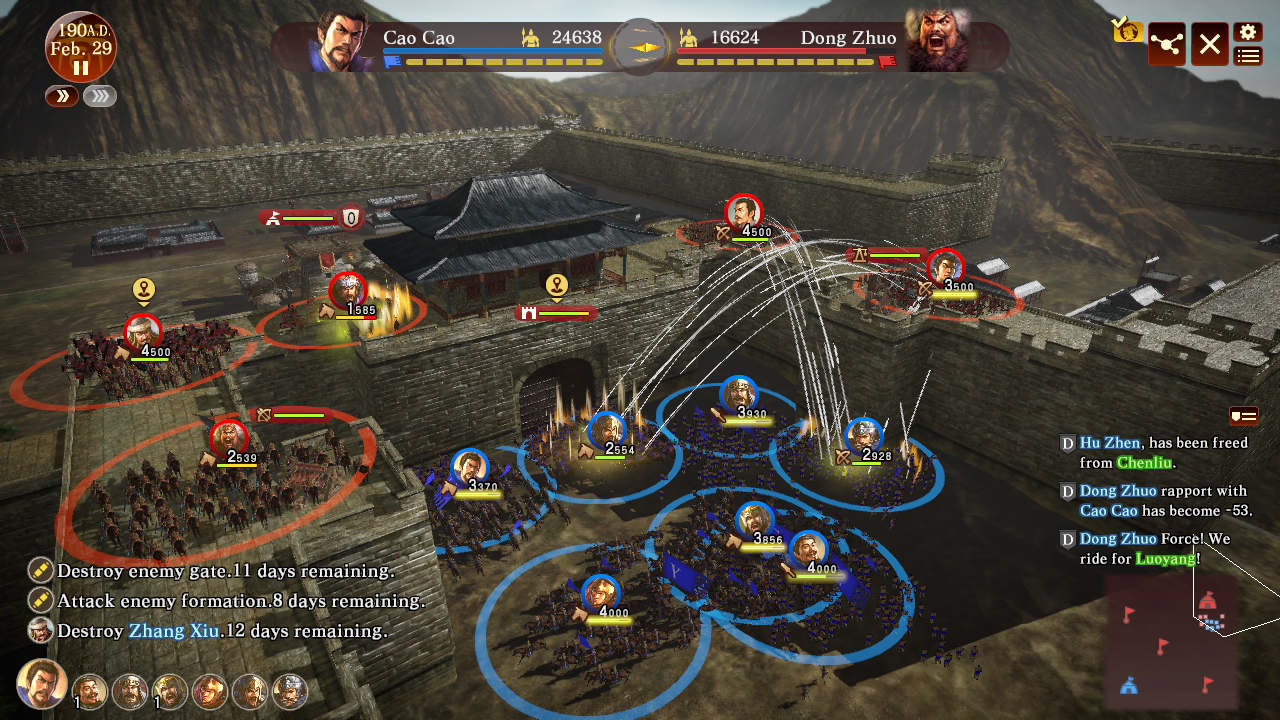Platforms:
PS4, PC
Released:
July 7, 2016
Publisher:
Koei Tecmo
Developer:
Koei
Did you take an ancient history class in high school and think, “Man, I wish i could re-unify China during the Han Dynasty?” Well, Romance of the Three Kingdoms XIII is the game for you, buddy. Being the father to the highly addictive Dynasty Warriors series, Romance of the Three Kingdoms XIII takes place in 2nd century China and spans across many years and characters.
I have previously dabbled in the strategy genre, from XCOM: Enemy Unknown, to Stronghold and Fire Emblem. But let me get straight to the point: this game is not for everyone. With more features and functions than even the most intricate RPG and a story so complex you’ll need a notepad and pen to keep track of it all, the game is very unforgiving for new players. But the series has still crafted itself out a niche, hardcore fan base of its own.
“Romance of the Three Kingdoms XIII has a tendency to ask you to do something without explaining how, and then punishing you for taking too long.”
Romance of the Three Kingdoms is based on the works of author Luo Guanzhong, written in the fourteenth century, which detail the era of constant conflict and warring factions in China’s history. These factions, characters and alliances can be hard to keep track of. Thankfully, the game gives newcomers the chance to play through ‘Hero Mode’, a tutorial which will run them through all of the games many characters and intricate gameplay mechanics. It’s just a shame that this mode made me want to throw the controller out of the window. Romance of the Three Kingdoms XIII has a tendency to ask you to do something without explaining how, and then punishing you for taking too long. This is especially painful in the longer Hero Mode missions, where it will fail you at the last minute, making you re-do the past hour of tedious gameplay all over again.

Combat is very streamlined, you select a unit group, and send them to decimate your opponents. In the early stages of the game, the units going into battle with you are predetermined, as are the officers you are allied with but you can specialise later on. By taking control of strongholds or defeating opposing officers, the enemy’s morale can drop causing their troops to dwindle at a quicker rate, and vice versa. It is up to the player whether to do a divide-and-conquer approach or perform a pincer attack, which entails sending two or more unit groups onto a smaller enemy group. You can use many things to your advantage in battle, which will spell victory for your army.
Another feature of the combat is choosing which officer you go into battle as. Officers can form political ties with monarchs and other figures, which can drastically affect future battles. Each officer also has different stats that play an important role in their battle effectiveness or the preparations beforehand.

The game also includes a couple of oddly placed mini-games, namely duelling and debating. These play like a slightly more painful version of Rock-Paper-Scissors. You pick an option, your opponent picks one as well and you hope for the best. They feel strangely out of place, and don’t add much to the game apart from filler in the long, drawn-out portions before battles. Sometimes they just play themselves. I had numerous instances early on in the game where the duel would start, and then just end without picking an option. Whilst these mechanics do add to the overall experience and can determine the outcome of various in-game events, they feel super out of place.
I did have some major gripes with this game. The frame-rate drops significantly in the actual gameplay portion of the game, along with the audio messing up a fair amount, and very dated graphics. The interface feels poorly optimised for consoles and the ‘Hero Mode’ tutorial made me far more confused than enlightened. As mentioned earlier, the battles are also fairly simple for a game dripping with complexity.
However, I am willing to forgive this game for being inaccessible to new players. Sure, it was unforgiving with my experience, but if a series can run for over 30 years, it must be doing something right. Romance of the Three Kingdoms XIII is not a console strategy game for everyone, but it’s still an impressive one. The political side of the gameplay along with the lore and the narrative and the sheer depth of the game prove to be more than enough to make this a game that you will certainly enjoy, if you are into some intense strategy.
Positive:
- Lore deeper than the voice of Barry White
- Complex elements for the strategy game connoisseur
- Long campaign with a lot of replay value
Negative:
- Audio and frame-rate issues
- Graphics reminiscent of a late PS2 era game
- Very unforgiving for new players
- Has a tendency to not explain things in the tutorial
This game isn’t awful. This game functions well enough to be enjoyable by even myself. What Romance of the Three Kingdoms is, is a niche game. It has a very dedicated fan base, who will appreciate it a lot more than any newcomer would. If you can get past the very restricting and painful barrier, what lies beyond is a fun and complex strategy game, regardless of all the issues.




